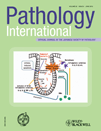
PATHOLOGY INTERNATIONAL
Scope & Guideline
Uncovering Breakthroughs in Medical Science Since 1951
Introduction
Aims and Scopes
- Molecular Pathology:
Research exploring genetic, epigenetic, and molecular alterations in various cancers, contributing to understanding tumor biology and potential therapeutic targets. - Clinical Pathology:
Studies that bridge laboratory findings with clinical outcomes, focusing on the diagnostic and prognostic implications of histopathological features in diseases. - Autopsy and Case Reports:
In-depth analyses of autopsy cases that provide insights into disease mechanisms and outcomes, contributing to the understanding of rare and complex conditions. - Innovative Diagnostic Techniques:
Development and assessment of novel diagnostic methods including advanced imaging, immunohistochemistry, and molecular profiling to enhance pathology practice. - Tumor Microenvironment:
Investigations into the role of the tumor microenvironment, including immune cell interactions and stromal components, in cancer progression and response to treatment. - Histopathological Classification:
Efforts to refine tumor classification systems that integrate histological and molecular characteristics to improve patient stratification and treatment options.
Trending and Emerging
- Integration of Genomic Data in Pathology:
An increasing emphasis on integrating genomic profiling with histopathological evaluation to inform personalized medicine and targeted therapies. - Artificial Intelligence in Diagnostics:
Growing interest in the application of artificial intelligence and machine learning techniques to enhance diagnostic accuracy and efficiency in pathology. - Immune Microenvironment Studies:
A rising focus on the immune landscape within tumors, including the characterization of immune cell types and their roles in tumor progression and response to therapy. - Pathological Mechanisms of COVID-19:
Emerging research on the pathological implications of COVID-19, particularly regarding its impact on various organ systems and post-viral complications, reflecting the pandemic's influence on pathology research. - Epigenetics in Cancer Pathology:
Increased attention to the role of epigenetic modifications in cancer development and progression, highlighting the complex interplay between genetics and environmental factors.
Declining or Waning
- Traditional Morphology Without Molecular Correlation:
There is a noticeable decline in studies focusing solely on traditional morphological assessments without integrating molecular or genomic data, as the field moves towards more comprehensive diagnostic approaches. - Single Case Studies with Limited Generalizability:
The publication of isolated case reports that lack broader implications or insights into larger trends in pathology is diminishing, as the journal favors studies with more significant clinical relevance. - Focus on Rare Tumors Without Broader Context:
While rare tumors remain important, there is a waning interest in studies that do not connect these findings to broader oncological principles or current diagnostic frameworks.
Similar Journals
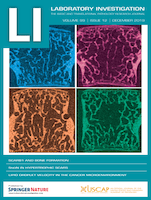
LABORATORY INVESTIGATION
Pioneering Discoveries in Cell and Molecular BiologyLaboratory Investigation is a premier academic journal published by Elsevier Science Inc, specializing in the fields of Pathology, Forensic Medicine, Cell Biology, and Molecular Biology. With its ISSN 0023-6837 and E-ISSN 1530-0307, this journal has been a significant contributor to scientific discourse since its inception in 1952, converging into its current form by 2024. It holds an impressive standing in its respective fields, featuring a 2023 Journal Rank of Q2 in both Cell Biology and Molecular Biology, and an elite Q1 ranking in Pathology and Forensic Medicine, reflecting its influence and quality of research, as seen in its Scopus ranks—17th out of 208 in Pathology and Forensic Medicine. Although it does not offer Open Access options, the journal remains a vital resource for researchers, professionals, and students who seek to disseminate and engage with high-caliber research findings. The importance of Laboratory Investigation is underscored by its commitment to advancing the understanding of laboratory and translational medicine, paving the way for innovations that enhance clinical practices.
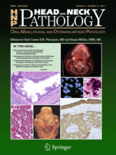
Head & Neck Pathology
Exploring the Complexities of Head & Neck DiseasesHead & Neck Pathology is a leading journal dedicated to advancing the study of pathologies affecting the head and neck region, published by Springer. With an ISSN of 1936-055X and E-ISSN of 1936-0568, this journal serves as a vital resource for the dissemination of research in oncology, otorhinolaryngology, and pathology, achieving impressive rankings of Q2 in Oncology and Q1 in both Otorhinolaryngology and Pathology & Forensic Medicine in 2023. Since its inception in 2007, Head & Neck Pathology has continued to provide a platform for innovative research findings, case studies, and reviews, fostering a deeper understanding of head and neck diseases. The journal's commitment to excellence is reflected in its rigorous peer-review process and accessibility through various academic platforms. Researchers, clinicians, and students will find valuable insights and knowledge that can enhance clinical practice and improve patient outcomes in the dynamic field of head and neck pathology.
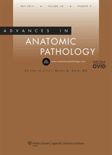
ADVANCES IN ANATOMIC PATHOLOGY
Unveiling New Horizons in Pathology and Anatomy.ADVANCES IN ANATOMIC PATHOLOGY is a leading peer-reviewed journal dedicated to the field of anatomical pathology, published by LIPPINCOTT WILLIAMS & WILKINS. With an impressive impact factor and consistent ranking in the Q1 category for both Anatomy and Pathology and Forensic Medicine, it serves as an essential resource for researchers, clinicians, and students alike. The journal has been a critical platform for disseminating significant findings and advancements in the discipline since its inception in 1996, boasting Scopus rankings of #1 in Anatomy and #11 in Pathology. While it does not provide open access, it maintains rigorous standards in the selection of articles, ensuring that published research reflects the latest developments and techniques in the field. As we look toward 2024 and beyond, ADVANCES IN ANATOMIC PATHOLOGY remains committed to advancing the science of pathology, fostering innovation, and enhancing clinical practice through impactful research.

ENDOCRINE PATHOLOGY
Elevating Standards in Endocrine MedicineENDOCRINE PATHOLOGY is a premier journal published by HUMANA PRESS INC, dedicated to advancing the understanding of endocrine disorders through innovative research and clinical practices. With an impressive impact factor and consistently ranked in the Q1 quartile across multiple categories such as Endocrinology, Diabetes and Metabolism, as well as Pathology and Forensic Medicine, this journal serves as a pivotal resource for researchers and professionals in the field. The journal covers a broad spectrum of topics related to endocrine pathology, providing insights into mechanisms, diagnostics, and therapeutics that inform both clinical and laboratory practices. Although it does not offer open access, its rigorous peer-review process ensures the dissemination of high-quality, impactful research that shapes clinical strategies and enhances patient care. With distribution spanning from its inception in 1990 to 2024, ENDOCRINE PATHOLOGY stands at the forefront of endocrine research, making it an essential read for anyone involved in the study and treatment of endocrine disorders.

Diagnostic Pathology
Empowering Researchers with High-Quality Pathology InsightsDiagnostic Pathology is a prominent open-access journal published by BMC, dedicated to advancing the field of pathology by providing a platform for high-quality research findings since its inception in 2006. Based in the United Kingdom, the journal covers a broad spectrum of topics within the realms of histology, pathology, and forensic medicine, facilitating discussions that are crucial for both clinical and laboratory settings. With an impressive impact factor that places it in the Q2 category across multiple categories including Histology and Miscellaneous Medicine, it ranks favorably in Scopus with notable positions in the 71st and 55th percentiles for Pathology and Histology respectively. As a valuable resource for researchers, professionals, and students alike, Diagnostic Pathology promotes the dissemination of cutting-edge studies and findings, thereby contributing significantly to the evolving landscape of medical science. The journal’s commitment to open access enhances its accessibility, ensuring that valuable research is freely available to a global audience.
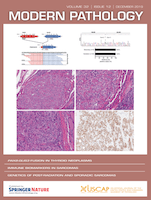
MODERN PATHOLOGY
Unveiling Breakthroughs in Modern PathologyMODERN PATHOLOGY is a premier journal in the field of pathology and forensic medicine, published by Elsevier Science Inc. With an impressive impact factor that places it in the top 1st quartile (Q1) for 2023, and a remarkable rank of 5 out of 208 in its category according to Scopus, it serves as a vital resource for researchers, professionals, and students alike. Established in 1988, the journal focuses on the latest advancements in diagnostic pathology, molecular pathology, and related fields, providing a platform for innovative research that drives the discipline forward. Although it does not operate under an open access model, readers can expect rigorously peer-reviewed publications that contribute to the growing body of knowledge in pathology. With a continuous commitment to excellence and relevance, MODERN PATHOLOGY remains a fundamental avenue for disseminating high-quality scientific research globally, facilitating the growth and development of its field.

Pathologie
Empowering Researchers in the Dynamic Field of PathologyPathologie is a distinguished academic journal published by Springer Heidelberg, dedicated to advancing the field of pathology and forensic medicine. With an ISSN of 2731-7188 and an E-ISSN of 2731-7196, this journal serves as a vital platform for researchers, professionals, and students to disseminate innovative findings and insights. Currently ranked in the Q3 category of pathology and forensic medicine according to the 2023 metrics, Pathologie reflects a commitment to quality and relevance in a dynamic research landscape. Despite its relatively recent establishment from 2022, the journal is gaining traction with a Scopus rank of 139 out of 208 in its category, positioning itself as an emerging resource within the academic community. While it operates under a subscription model, the importance of the journal lies in its objective to facilitate the exploration of diverse pathological processes and enhance forensic methodologies, ultimately improving clinical outcomes and investigative practices. As it continues to grow, Pathologie stands poised to impact the pathology domain significantly.
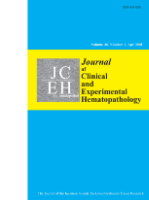
Journal of Clinical and Experimental Hematopathology
Empowering Researchers with Open Access Discoveries.The Journal of Clinical and Experimental Hematopathology, published by the Japanese Society of Lymphoreticular Tissue Research, is a vital resource dedicated to advancing the field of hematopathology. With an impressive Open Access model since 2019, this journal provides researchers, clinicians, and students from around the world with unfettered access to cutting-edge research and developments in hematology and pathophysiology. Based in Japan, it has established a prominent reputation in the academic community, boasting a Q3 quartile ranking in Hematology and Q1 rankings in both Medicine (Miscellaneous) and Pathophysiology as of 2023. With its innovative contributions and high visibility, the journal not only fosters scholarly discourse but also impacts clinical practices, making it an essential publication for anyone interested in the complexities of hematologic disorders. For submissions and further inquiries, the journal is located at Nagoya University Graduate School of Medicine, Japan.

AJSP-Reviews and Reports
Bridging Gaps, Inspiring InnovationAJSP-Reviews and Reports is a peer-reviewed journal dedicated to the advancement of knowledge within the field of pathology and forensic medicine. Published by the renowned Lippincott Williams & Wilkins, this journal plays a vital role in disseminating insightful reviews and reports that contribute to the understanding and application of diagnostic practices and forensic investigations. While currently listed in the fourth quartile (Q4) within its category according to the 2023 metrics, the journal is committed to enhancing its impact and fostering scholarly dialogue among researchers, professionals, and students in the medical community. Despite challenges in Scopus rankings, it provides a platform for significant discourse and innovation in pathology. Operating from the United Kingdom, AJSP-Reviews and Reports is positioned to bridge gaps in knowledge and inspire future research developments. Readers can access valuable findings without open access barriers, allowing for efficient information sharing within the medical field.

Oral & Maxillofacial Pathology Journal
Innovating Pathways in Maxillofacial ResearchOral & Maxillofacial Pathology Journal is a prominent peer-reviewed publication dedicated to advancing the field of oral and maxillofacial pathology. Published by the KAIRALI SOCIETY OF ORAL & MAXILLOFACIAL PATHOLOGISTS, this journal aims to provide a platform for sharing innovative research, clinical practices, and new techniques related to the diagnosis and management of oral diseases. With a commitment to open access, it ensures that valuable knowledge reaches a global audience of researchers, dental professionals, and students alike. Although specific impact metrics such as the HIndex and Scopus ranking are not listed, the journal is regarded as an essential resource for those involved in the oral health community. It plays a crucial role in fostering collaboration and disseminating cutting-edge advancements that can enhance patient care and clinical outcomes in oral pathology. For professionals looking to stay ahead in this dynamic field, Oral & Maxillofacial Pathology Journal serves as an indispensable tool for both foundational learning and advanced research.